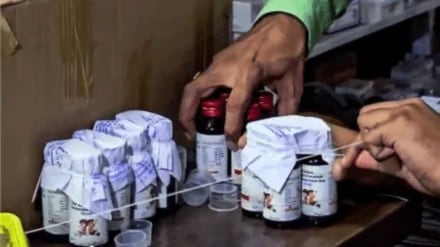The World Health Organization (WHO) has issued a health alert after identifying three contaminated cough syrups in India that may be linked to the deaths of at least 20 children in Madhya Pradesh’s Chhindwara district. The global health agency has urged all countries to report if these medicines are detected within their borders.
According to the WHO, the syrups here are specific batches of Coldrif from Sresan Pharmaceutical, Respifresh TR from Rednex Pharmaceuticals, and ReLife from Shape Pharma. Lab analysis revealed that these cough syrups were contaminated with diethylene glycol (DEG), a toxic industrial solvent that can cause severe kidney and liver damage, and even death when consumed. The concentration found in the samples was nearly 500 times above the permissible limit.
India’s Central Drugs Standard Control Organization (CDSCO) confirmed that the affected syrups were reportedly consumed by children under the age of five in Madhya Pradesh. However, the regulator clarified that there was no evidence of export and that none of these medicines had been shipped abroad. The U.S. Food and Drug Administration (FDA) also confirmed that the contaminated products were not exported to the United States.
Delhi and Punjab ban Coldrif syrup
Following the WHO advisory, the Delhi Drugs Control Department swiftly issued a public warning banning the sale and use of Coldrif Syrup, citing serious health risks.
In a notice dated October 10, the department said a government lab analysis found that the syrup was ‘Not of standard quality’ and adulterated with diethylene glycol, making it unsafe for consumption.
“All stakeholders are directed to refrain from dealing in the above cough syrup with immediate effect and not to indulge in purchase, sales, or distribution,” the advisory stated. “The general public is also sensitised to abstain from using this cough syrup,” it further stated.
Delhi’s Health Minister Pankaj Singh told news agency ANI that the national capital had already taken preventive steps. “We have issued the same advisory as the Government of India. In the past six months, we haven’t awarded a single tender to that company. All government and private hospitals, as well as chemist shops, have been instructed not to prescribe or dispense this medicine,” Singh said.
Officials from the Delhi Drug Control Department have also confirmed that the Coldrif syrup was never distributed in Delhi, according to a report by The New Indian Express.
“A thorough review of the supply chain shows that no consignment of Coldrif cough syrup reached Delhi. Still, as a precaution, we have collected samples of various cough syrups from across the city for laboratory testing,” a senior official told the outlet.
Around 30 samples have been collected from chemist shops and wholesalers across Delhi to test for DEG contamination and heavy metals. These samples have been sent to a government laboratory for detailed analysis.
Meanwhile, Punjab has also banned the sale, distribution, and use of Coldrif Syrup, following the tragic deaths in Madhya Pradesh. Punjab’s health authorities acted after receiving alerts from the central government and the WHO.
In Madhya Pradesh, Deputy Chief Minister and Health Minister Rajendra Shukla confirmed that four more children are currently under treatment for suspected poisoning linked to the cough syrup.
Centre tightens drug quality checks
Amid growing concerns, the Drugs Controller General of India (DCGI) has directed all states and Union Territories to enforce strict adherence to the Drugs Rules, 1945, particularly for testing raw materials and finished pharmaceutical products.
This directive comes after a series of global warnings involving Indian-made cough syrups in recent years. Similar incidents in The Gambia and Uzbekistan in 2022 led to international scrutiny of India’s pharmaceutical quality control systems, after WHO linked contaminated syrups to dozens of child deaths.
Experts say this case the urgent need for stronger surveillance and enforcement mechanisms in drug manufacturing. “Even a small lapse in testing can lead to catastrophic consequences,” said a senior public health official. “The system needs consistent and transparent monitoring.”
For now, health officials are urging parents and healthcare providers to avoid using unverified cough syrups, especially for children under five, until lab results confirm which products are safe.
